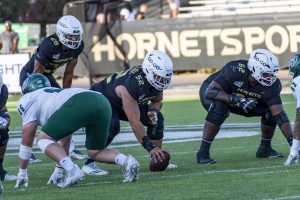Racist graffiti on campus last month went unreported to police

Image: Racist graffiti on campus last month went unreported to police:CSUS Police Chief, Kenneth Barnett:
March 19, 2003
The discovery of racist graffiti on campus last month has called into question how the campus deals with graffiti incidents.
Anti-Muslim graffiti was found on bathroom walls on all four floors in the library on Feb. 19. A week later anti-U.S. government sentiments were painted on the same walls, said Library Dean Terry Webb.
These incidents reflect two of 67 graffiti occurrences within the last year. The campus police records show little evidence that the graffiti has been reported.
Aside from a hate-related bomb threat in 2001, a hate incident in 2002, and one report of a hate crime that came from graffiti, police officials said they have no idea how much graffiti actually happens on campus.
“We can’t say anything about it if we don’t know about it,” said Sacramento State Chief of Police Ken Barnett.
Barnett said he would like to see every incident reported so investigations into the matter could ensue.
Sometimes graffiti is a hate crime, depending on its content, campus police spokesman John Hamrick said. The anti-Muslim graffiti incident is considered a hate crime due to its content, according to police definition.
Campus policy states that hate crimes include a verbal threat of violence that can be carried out, an act that results in property damage, or any other criminal act that directs its attention against a public or private agency.
Using this definition, most of the graffiti incidents reported to Facilities Management would constitute a hate crime.
“It’s a common occurrence. I don’t know of much graffiti that’s not intended to offend somebody,” said Lisa Hall, Facilities Management Administrative Services Manager.
Common descriptions in reports of graffiti that Facilities Management takes contain the words “racial,” “obscene,” “offensive” and “profanity.” The reports do not document what is said word for word, and do not handle the responsibility of notifying the police.
“Our responsibility is to make sure our campus is in a condition so there is no offense,” Hall said. “Our role is to maintain the campus…not from a public safety perspective.”
Barnett said he wants anyone who discovers graffiti or learns about it, no matter how minor, to check with the campus police and make a report.
“When we receive information we document the incident, then we contact Facilities Management and make a request for removal, especially derogatory phrases or words,” Hamrick said.
“If it’s a case of violence, injury or danger, or against the law, we’re required to report those” to police, Webb said. The library has policies in place to handle graffiti incidents, he said.
The hate crime with anti-Muslim graffiti was never reported to the police.
Facilities Management invests a great deal of resources cleaning up graffiti on campus in a timely manner, but it’s so common, it’s responded to routinely, Hall said.
“This is not a bigger issue than it’s ever been; it’s always been an issue. Graffiti is graffiti. It’s always been there,” Hall said.
Reports indicate that graffiti is most common when the campus is at its full function, with only 19 percent of all graffiti reports in the last year during summer months.
“It’s a matter of awareness — of somebody defining for us what should and should not be reported. They’re the experts in the field and they need to tell us,” Hall said, referring to campus police.
Hall said the responsibility of combating graffiti belongs to the campus police, to make people aware of the seriousness of graffiti when it constitutes hate crime.
Hall said the resources going to paint over the graffiti could be put to more productive use.
“If we could only take the amount of resources we invest in that (removing graffiti) and paint a few classrooms, that would be great. The classrooms definitely could use it,” Hall said.
Facilities Management could not produce the financial data indicating how much the graffiti clean-up costs.
If the police are not aware of potential hate crimes they cannot really do anything about them, Barnett said.
The key is to “Report it, report it, report it,” Barnett said. “It’s just more effective.”
Click here to send private feedback about this article to the State Hornet’s News staff.
























































































































